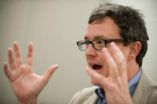(Press-News.org) CAMBRIDGE, Mass. -- Technology firms frequently require workers to sign non-compete agreements, which typically bar their employees from joining rival companies for one to two years. For firms, the agreements keep workers from taking the knowledge and skills they have acquired and using them to help a rival.
But a new study of more than 1,000 engineers, conducted by an MIT professor, shows that non-compete agreements come with a high cost for employees: When those workers do shift jobs, roughly one-third of them end up leaving their chosen industry altogether, often at significant financial cost to themselves.
"People are highly constrained by their non-compete agreements," says Matt Marx, an assistant professor at the MIT Sloan School of Management. "When people leave their jobs, they often leave their industry. Non-compete agreements leave them with a choice of staying where they are, or taking a career detour."
Marx's findings are presented in a new paper, "The Firm Strikes Back: Non-compete Agreements and the Mobility of Technical Professionals," published in the October issue of the American Sociological Review.
Many workers not informed until starting a job
Non-compete agreements have become a common feature of the workplace. Marx has found that about half of tech-sector employees must sign them, while another recent academic study has determined that about 70 percent of executives sign them as well.
The agreements are partly a byproduct of the technology sector's rapid pace of change, which has altered America's business landscape in recent decades. "We're no longer in that era where people take one job out of college and stay there for 30 years," Marx says. "That's not life anymore."
And while non-compete agreements are often associated with information technology firms, Marx says the issue applies to many business sectors. "Biotech companies use non-competes as much as the software industry does," he observes. The agreements are also a matter of state law; some states use them and others do not.
In his study, Marx surveyed 1,029 engineers, who were initially randomly selected from a membership list of the Institute of Electrical and Electronics Engineers (IEEE), covering a variety of high-tech fields. He also conducted separate in-depth interviews with 52 people who have worked on voice-recognition technology (a field in which Marx himself once worked). In all, Marx found that 32.6 percent of tech workers who sign non-compete agreements wind up moving to entirely different industries when they take their subsequent jobs. In many cases, these workers stopped applying specific skills they had developed — often after obtaining a PhD — and took pay cuts.
"When people take a career detour, they sometimes earn less money, lose touch with their colleagues, and their skills atrophy," Marx says.
To be sure, as Marx notes, a common defense of non-compete agreements is that well-educated employees should recognize these pacts as a standard practice and understand the implications of signing one. However, Marx notes, most people in his survey who had signed a non-compete agreement were not informed they would need to do so until they had already committed to the job in question.
"Seventy percent of people said they were informed only after they accepted the offer," Marx says. "Half the time it was after they showed up for work. On the first day, they enroll in a 401(k), set up direct deposit, and, oh yeah, are given this non-compete thing to sign. People get savvy as they get older, but a lot of people are blindsided by it."
As a remedy, the state of Oregon, for one, recently passed a law requiring firms to make clear in offer letters if employees will be expected to sign a non-compete agreement.
The geography of the non-compete
The uneven mixture of state-level regulations concerning non-compete agreements adds some further wrinkles to the issue. Ten states — including a pair of high-tech hubs, California and Washington — restrict the use of non-compete agreements, thus allowing workers to move around more freely. In Massachusetts, by contrast, non-compete agreements are enforced, although the state legislature has held hearings this year on the subject of non-compete agreement reform.
In his ongoing research, Marx is examining whether an awareness of non-compete agreements pushes high-tech workers to look for jobs in states such as California where non-compete agreements are a non-factor.
"Although non-competes prevent people from changing jobs within a state," Marx notes, the agreements may "encourage mobility out of a state. If people can't get jobs locally, they [may] go to other states like California where they have that flexibility."
Marx is also currently researching whether non-compete agreements affect the flow of workers within industries, and whether they affect the pool of talent available to smaller companies and startup firms.
INFORMATION: END
Over the past few years, a movement to reform spousal support (called "alimony" and "spousal maintenance" in some states) has been making its way across the nation. Spousal support in its traditional form consists of the money-earning spouse providing financial support to the other spouse after a divorce. The amount of spousal support can be agreed upon or calculated based on the earning spouse's ability to pay and the needs of the non-earning spouse.
Because of changing times -- in which more and more wives and mothers work outside the home -- many ...
The Great Recession and the currently tepid economic recovery swelled the ranks of American households confronting hunger and food insecurity by 30 percent. In 2010 48.8 million Americans lived in food insecure households, meaning they were hungry or faced food insecurity at some point during the year. That's 12 million more people than faced hunger in 2007, before the recession, and represents 16.1 percent of the U.S. population.
Yet hunger is not readily seen in America. We see neither newscasts showing small American children with distended bellies nor legions of thin, ...
Why are some places more prone to bribery and corruption than others? Part of the answer seems to be the level of collective feeling in a society, according to research by Pankaj Aggarwal, University of Toronto Scarborough (UTSC) professor of marketing in the Department of Management, and Nina Mazar, University of Toronto professor of marketing.
Aggarwal and Mazar discovered that people in more collectivist cultures – in which individuals see themselves as interdependent and as part of a larger society – are more likely to offer bribes than people from more individualistic ...
Before Congress passed a budget deal in early August 2011, President Obama expressed concern in a televised speech that the federal government would be unable to pay Social Security benefits without a long-term agreement on the budget. Others in Washington, including President Obama's budget director Jack Lew and Senate majority leader Harry Reid, disputed the president's assertion, maintaining that Social Security is a self-funding program with a $2.6 trillion trust fund that is capable of funding benefit payments for the next 25 years. How could politicians deliver such ...
Zinc plays a critical role in regulating how neurons communicate with one another, and could affect how memories form and how we learn. The new research, in the current issue of Neuron, was authored by Xiao-an Zhang, now a chemistry professor at the University of Toronto Scarborough (UTSC), and colleagues at MIT and Duke University.
Researchers have been trying to pin down the role of zinc in the brain for more than fifty years, ever since scientists found high concentrations of the chemical in synaptic vesicles, a portion of the neuron that stores neurotransmitters. ...
Miami Beach, Fla. — The prognosis for patients with stage II and III inoperable non-small cell lung cancer (NSCLC) is poor, with only about 15 percent of patients surviving at five years post-treatment for the disease. While new treatment strategies are being intensely studied, timely assessment of their efficacy has proven difficult. In a presentation today, Mitchell Machtay, MD, principal investigator of the ACRIN 6668/RTOG 0235 trial and RTOG deputy chair, reported the that post-treatment F-18 fluorodeoxyglucose-positron emission tomography (FDG-PET) scans show promise ...
EAST LANSING, Mich. -- What makes people great? Popular theorists such as the New Yorker's Malcolm Gladwell and the New York Times' David Brooks argue that intelligence plays a role -- but only up to a point. Beyond that, they say, it's practice, practice, practice.
Zach Hambrick agrees with the practice argument -- imagine where Bill Gates would be if he hadn't honed his programming skills, after all -- but the Michigan State University scientist takes exception to the view that intelligence plays no role in determining excellence.
In a provocative new paper, Hambrick ...
Social Security Commissioner Michael J. Astrue recently announced the expansion of the list of conditions that qualify a benefit applicant for a fast-track application under either the Quick Disability Determination (QDD) or Compassionate Allowances program (CAL). The SSA created the QDD and CAL programs in 2008 to help get disability benefit payments to those who need them most. It is important for those who apply for Social Security disability benefits to be aware of the fast-track process to see if they qualify.
What Conditions Qualify?
The fast-track program initially ...
New data gathered from the latest census and the Center for Disease Control's National Vital Statistics System reveal that states that perform or recognize same-sex marriage have lower divorce rates for all couples compared to states that do not recognize or ban same-sex marriage.
Five of the ten states with the lowest divorce rates are among the eight states that perform or recognize same-sex marriage. In 2009, the divorce rate for these states was 41.2 percent, compared with 50.3 percent in states without same-sex marriage. That rate increases to 53.2 percent if one ...
A University of Colorado Boulder-led team excavating a Maya village in El Salvador buried by a volcanic eruption 1,400 years ago has unexpectedly hit an ancient white road that appears to lead to and from the town, which was frozen in time by a blanket of ash.
The road, known as a "sacbe," is roughly 6 feet across and is made from white volcanic ash from a previous eruption that was packed down and shored up along its edges by residents living there in roughly A.D. 600, said CU-Boulder Professor Payson Sheets, who discovered the buried village known as Ceren near the ...

